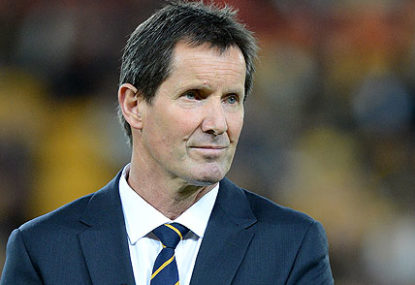andycox
new author
Roar Rookie

Have I got your attention? Great. Because as outlandish as the above headline is, I would argue that there may be an element of truth to it.
When we look at some of the golden achievements of Australian rugby; namely the 1984 Grand Slam, the 1991 World Cup and the 1999 World Cup, the coaches that took these sides to victory benefited hugely from their predecessors in ways the previous coach never really would have predicted.
Take the Grand Slam.
It may be argued that one of the greatest influences upon that result in 1984 was the 1982 Tour of New Zealand under coach Bob Dwyer.
Prior to departure, the Queensland mainstay of the national side made themselves unavailable en masse. Dwyer and his selectors filled the hole in the team with a number of young players. One of these was a winger-cum-fullback named David Campese.
While the forwards were depleted, the energetic back play took this team within a pass of a series win. If the Wallabies could be this close with 30% of the ball, imagine what would happen if parity were achieved in the possession stat.
It is here that Alan Jones stood on the shoulders of Bob Dwyer. He already inherited potency. All that was required was a fair share of the ball. From evidence of his coaching both with Manly and The King’s School, this was Jones’ specialty.
To inherit a side weak in areas of your expertise, and strong where you may not be, is quite frankly manna from heaven. So by capitalising on Dwyer’s work, Jones got the result.
The favour could be said to be repaid in full when Dwyer was handed back the keys. Arguably, the Wallabies’ forwards’ dominant attitude was inherited by Dwyer from Jones. This new mindset was retained even though players changed. The result: A World Cup.
Now when it comes to Rod Macqueen, the often-derided Greg Smith may have had an even stronger hand than first thought in the 1999 World Cup title.
Although Smith appeared to be inconsistent with his selection at times, he was consistent in his philosophy; to keep a player performing at his best he should never feel assured of his place in the side.
As a result, an inordinate number of players wore the green and gold in this period. Some better than others.
While it may have caused chaos within the group, this tactic created something sadly lacking in Australian Rugby. Depth.
When Macqueen took over, he had a vast number of players with international experience to choose from. His task, then, was to stabilise the team, give them a sense of security so they could express themselves confidently.
In the run of Bledisloe Cup wins that surrounded the World Cup win it is amazing how little the team changed.
Which brings me to Robbie. Given the experiences of the past, there is good reason to suggest he’s set up the result for the next man in.
Firstly, there are the huge number of players blooded this year. The oft-mentioned statistic is 41 injured players out at the moment.
For the future, that equates to 41 more players with Test experience that would otherwise be in pre-season training or trundling around in Shute Shield.
Secondly, like plants that have grown on rocky ground, the current crop of Wallabies should flourish given a bit of fertiliser. We’ve all heard Robbie speak, and quite frankly his comments at press conferences leech colour from a room.
I’m sure the players get similar words. If this group was given a huge injection of confidence, vitality and open, honest lines of communication, can you imagine how they would thrive?
When in the All Blacks, under the tutelage of Laurie Mains, Keith Quinn once quipped that “the dog looked too much like its master.”
A year later, injected with enthusiasm by John Hart, the team took the first Tri Nations title as well as a first-ever series win in South Africa.
As they say, the darkest hour is before the dawn.
If this is the dawn of a new era in Australian Rugby, we may have Robbie to thank.